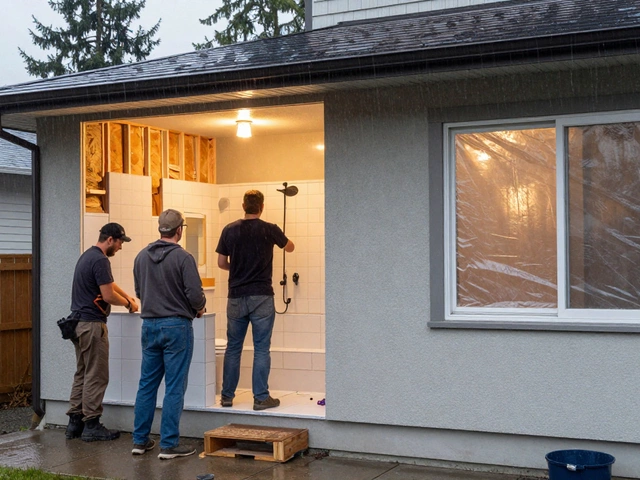Ever wonder why people say "contractor" instead of just "builder"? You hire someone to put up your new deck, add a room, or renovate your kitchen-and they’re called a contractor. But if they’re building things, why not just call them a builder? It’s not just semantics. There’s a legal, practical, and historical reason behind the word.
It’s About the Contract, Not the Hammer
The word "contractor" comes from the word "contract." A contractor is someone who signs a formal agreement to complete a job under specific terms. That’s it. They don’t just show up with tools and start swinging hammers. They agree to deliver a result by a deadline, for a set price, with certain materials, and often under specific building codes.
A builder might be the person who actually lays bricks or installs framing. But the contractor is the one who hires the builder, the electrician, the plumber, the roofer, and the landscaper-and makes sure they all show up on time, work together, and meet the homeowner’s expectations. The contractor doesn’t need to know how to wire a circuit or pour concrete themselves. They need to know how to manage the people who do.
In fact, many contractors never touch a tool during the entire project. They coordinate permits, schedule inspections, handle payments, and deal with delays. That’s why you’ll hear phrases like, "I hired a contractor to build my house," even if the actual construction is done by a crew of subcontractors.
Legal Protection and Liability
In Canada, and especially in places like British Columbia where building regulations are strict, calling someone a "builder" without proper licensing can get you in trouble. The term "contractor" is legally defined. In BC, for example, you need a BC Housing License to operate as a residential builder or contractor. That license means you’re accountable under the law.
If something goes wrong-say, the foundation cracks or the roof leaks-the homeowner can file a claim through the Homeowner Protection Office. That system only applies to licensed contractors. A "builder" who isn’t licensed might be an independent carpenter, but they can’t legally take on full-home projects or collect deposits over $5,000 without a contractor’s license.
That’s why you’ll see "Licensed Contractor" on trucks, websites, and business cards. It’s not marketing fluff-it’s a legal requirement. And it’s why homeowners are told to always verify a contractor’s license before signing anything.
The History: From Master Builders to Modern Contractors
Back in the 1800s, most homes were built by master builders-craftsmen who could do everything: carpentry, masonry, roofing, even plumbing. They were the complete package. But as cities grew and homes got more complex, one person couldn’t handle it all.
By the early 1900s, specialization became the norm. Electricians, plumbers, HVAC techs-all emerged as separate trades. Someone had to bring them together. That’s when the contractor role was born. The contractor became the project manager, the point person, the one responsible for the final outcome.
The term stuck because it described the relationship, not the skill. It wasn’t about who swung the hammer-it was about who took the risk and signed the paper.

What’s the Difference Between a Builder and a Contractor?
Here’s the simplest way to tell them apart:
- A builder is a trade professional who performs physical construction work-framing, roofing, finishing drywall, installing cabinets.
- A contractor is the person or company that manages the entire project, hires builders and subcontractors, handles permits, and takes legal responsibility for the job.
Some companies are both. A residential construction firm might have in-house carpenters and also hire electricians. They’re a contractor because they manage the project. Their carpenters are builders.
But if you hire a carpenter directly to build a deck, and you’re the one ordering permits, buying materials, and scheduling inspections-you’re acting as the contractor, even if you’re not a professional. The law doesn’t care if you’re a professional. It cares if you’re managing the project.
Why It Matters to Homeowners
If you’re planning a renovation or new build, understanding this difference saves you money and stress.
When you hire a contractor, you get:
- A single point of contact for every issue
- Guarantees and warranties on workmanship
- Access to insurance and bonding (which protects you if they disappear)
- Compliance with building codes and inspections
When you hire individual builders without a contractor managing things, you become the project manager. That means you’re responsible for:
- Coordinating schedules between plumbers, electricians, and framers
- Buying materials and storing them on-site
- Getting permits and passing inspections
- Resolving conflicts between trades
Most homeowners don’t have the time or expertise to do that. That’s why hiring a contractor-even if it costs more upfront-is often cheaper in the long run. A bad hire can lead to rework, delays, fines, or even unsafe conditions.

Red Flags: When Someone Calls Themselves a Builder
Not everyone who says "builder" is lying. But some use the word to avoid accountability. Watch out for:
- Someone who refuses to show a license number
- A person who asks for cash-only payments
- A quote that’s way below market rate (they’re probably cutting corners or skipping insurance)
- No written contract or vague terms like "we’ll do what’s needed"
In Vancouver and across BC, you can verify a contractor’s license for free at the Homeowner Protection Office website. Always do it before paying a dime.
What About General Contractors?
"General contractor" is the most common type you’ll encounter for home projects. They manage all the trades. But there are also specialty contractors-like roofing contractors, plumbing contractors, or electrical contractors-who focus on one trade and often work under a general contractor.
General contractors are the ones who take full responsibility for the project. If the plumbing fails because the plumber they hired did a bad job, the general contractor is still on the hook. That’s why they’re careful about who they hire.
That’s also why you’ll often see a general contractor’s name on the permit, not the plumber’s or electrician’s. The law holds the general contractor accountable.
Bottom Line: It’s Not About the Tools, It’s About the Responsibility
So why is a builder called a contractor? Because the person managing the job isn’t just building something-they’re taking on legal, financial, and logistical responsibility. The word "contractor" isn’t fancy jargon. It’s a label that means: "I’ve signed on the line. I’m responsible for this. If it breaks, I fix it."
That’s why you don’t hire a "builder" for a full home project. You hire a contractor. Because when you’re spending tens of thousands of dollars, you want someone who’s legally bound to deliver-not just someone who knows how to use a hammer.
Can a builder legally call themselves a contractor?
In British Columbia and most Canadian provinces, no-not without a license. The term "contractor" is regulated. Someone who only does construction work (like framing or finishing) is a builder or tradesperson. To legally call themselves a contractor and take on full projects, they must be licensed by BC Housing or the equivalent authority in their region. Using the title without a license can result in fines and legal action.
Do I need a contractor for a small renovation?
It depends on the scope. For minor updates like repainting, replacing fixtures, or installing shelving, you don’t need a contractor. But if you’re changing structural elements, adding plumbing or electrical, or altering the footprint of your home, you need a licensed contractor. Permits are required for these jobs, and only licensed contractors can pull them in most cases. Skipping this risks safety issues and future problems when you sell.
What’s the difference between a general contractor and a subcontractor?
A general contractor manages the entire project and hires subcontractors to handle specific trades-like electrical, plumbing, or roofing. Subcontractors are specialists who work under the general contractor’s supervision. They don’t deal directly with the homeowner unless hired independently. The general contractor is responsible for the final result, while subcontractors are only responsible for their own work.
Can I be my own contractor?
Yes, in many areas, homeowners can act as their own contractor for their primary residence. This is called an "owner-builder" arrangement. But you still need permits, inspections, and must follow building codes. You’re legally responsible for everything. Most people avoid this because it’s time-consuming and risky. If something goes wrong, you can’t file a claim against yourself like you could with a licensed contractor.
How do I verify if a contractor is licensed?
In British Columbia, go to the Homeowner Protection Office website and use their license lookup tool. Enter the contractor’s business name or license number. You’ll see their status, coverage type, and any complaints. Always check before signing a contract. A licensed contractor will gladly provide their number. If they hesitate, walk away.








